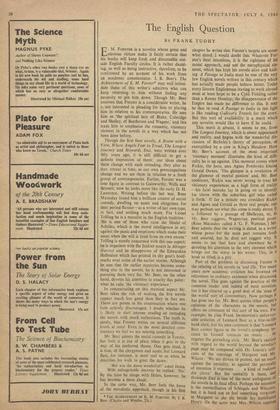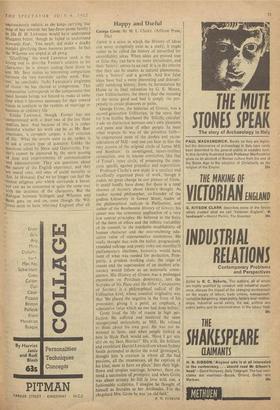The English Question
BY FRANK TUOHY El; M. FORSTER is a novelist whose great and ' obvious virtues make it fairly certain that his books will keep fresh and discussable out-
side English Faculty circles. It is rather daunt- ing, as well as being instructive, therefore, to be confronted by an account of his work from
an academic commentator. J. B. Beer's The Achievement of E. M. Forster* may well intimi- date those of this writer's admirers who can
keep returning to him without feeling any necessity to pin him down. Though Mr. Beer assumes that Forster is a considerable writer, he
Is not interested in pleading for him or placing
him in relation to his contemporaries. He sees him as 'the spiritual heir of Blake, Coleridge
and Shelley, of Beethoven and Wagner,' and this leads him to emphasise the romantic, visionary element in the novels in a way which has not been done before.
Though the first four novels, A Room with a View, Where Angels Fear to Tread, The Longest Journey and Howards End, were written over
fifty years ago, it is still difficult to get a definite impression of them: our ideas about them change with each rereading, they alter as they retreat in time, as our own preoccupations change and we see them in relation to a fresh group of contemporaries. Earlier, Forster was a lone figure in contrast to Galsworthy, Wells and Bennett; now he looks more like the early D. H.
Lawrence. Writing before the last war, Rose Macaulay found him a brilliant creator of social comedy, dwelling on aunts and clergymen for their period flavour—as a writer of her own type, fact, and nothing much more. For Lionel Trilling he is a moralist in the English tradition: 'He is one of those who raise the Shield of Achilles, which is the moral intelligence in art, against the panic and emptiness which make their onset when the will is tired from its own excess.' Trilling is mostly concerned with this one aspect;
he is impatient with the friskier essays in A binger Harvest and he disapproves of the Edwardian Hellenism which has printed its shy goat's hoof-
marks over some of the earlier stories. Although he sees that the earlier mysteries become some- thing else in the novels, he is not interested in pursuing them very far. Mr. Beer, on the other hand, devotes his attention to exactly this point: what he calis the visionary experience.'
In concentrating on this mystical aspect Mr. Beer takes the risk of making the five novels appear much less good than they in fact are.
There are points in his examination where one. feels actively discouraged; I doubt whether he likely to start anyone reading or rereading the novels with much enthusiasm. The truth is, surely, that Forster writes on several different levels at once. Even in the most detailed com- mentary we feel we are missing something.
Mr. Beer admits the social comedy in Forster, but feels it is out of place when it gets in the way of his preferred theme. One gets tired, it is true, of the clergymen and aunts, but Leonard Bast, for instance, is most real to us when he describes his walk to greet the dawn: 'But was the dawn wonderful?' asked Helen. With unforgettable sincerity he replied: 'No.' By the time he sleeps with Helen, however, he has become a mere shade.
In the same way, Mr. Beer feels the force of the moralistic approach, though in his first
* THE ACHIEVEMENT OF E. M. FORSTER. By J. B. Beer. (Chatto and Windus. 25s.) chapter he writes that Forster's targets are some- what dated. I would doubt this. Whatever For- ster's final intentions, it is the rightness of his moral approach, and not the metaphysical ele- ment, which has kept his novels alive and kick- ing. A Passage to India must be one of the very few English novels written in this century which has actually made people behave better. Today every literate Englishman leaving to work abroad must at least hope to be a Cyril Fielding rather than a Ronny Heaslop; the disappearance of the Empire has made no difference to this. It may be that to read A Passage to India in this light is like reading Gulliver's Travels for the story. But this sort of availability is a merit which any novelist would like to have if he could.
This merit is absent, it seems to me, front The Longest Journey, which is about appearance and reality, and begins with the wonderful dis- cussion of Berkeley's theory of perception, as exemplified by a cow in King's Meadow. Here Mr. Beer's account of the most important 'visionary moment' illustrates the kind of diffi- culty he is up against. This moment comes when Rickie, the hero, sees Agnes Pembroke kissing Gerald Dawes. 'The glimpse is a revelation of the glamour of mortal passion' and, Mr. Beer continues, `Rickie was never wrong to treat his visionary experiences as a high form of reality —his fatal mistake lay in going on to identify his vision with the suburban girl who called it forth.' If for a minute one considers Rickie and Agnes and Gerald as three real people, one may perhaps see what this scene is really about. It is followed by a passage of Shelleyan, or, as Mr. Beer suggests, Wagnerian, poetical prose. (Rose Macaulay called it 'G. F. Wattsian.') Mr. Beer admits that the writing is dated, in a writer whose prose for the most part remains fresh and assured, but he does not suggest why. It seems to me that here and elsewhere he 15 devoting his attention to the very element which brings out the worst in his writer. This, in a book so titled, is a pity. Part of the problem in discussing Forster is the relating of his novels to 'real life.' For many years now academic criticism has frowned 00 references to ordinary existence when discussing the novel. This goes against the practice of the common reader and indeed of most novelists, but it has cleared up a good deal of the 'man Of the world' sort of commentary. Now perhaps it has gone too far. Mr. Beer quotes other people s .opinions of the characters in the novels, but offers no comment of this sort of his own. For example, he cites Frank Swinnerton's unfavour- able criticism of Leonard Bast as a true-to-life bank clerk, but his own comment is that 'Leonard Bast cannot figure in the novel's symphony be- cause he himself conta.ns no music . . . 110 negates the prevailing style. Mr. Beer's cautinti with regard to the world beyond the novelists page may be compared with Dr. Leavis's critk cism of the marriage of Margaret and Mr,: Wilcox: 'We are driven to protest, not so inticvl against the unreality, as against the perversity of intention it expresses . . . a kind of trahis00 des clercs.' But the unreality is there, and, Howards End is one of the most ambiguous of the novels in its final effect. Perhaps the intention is the reconciliation of Schlegels and Wilcoxes, but it is hard not to feel something voracious in Margaret as she sits beside her humiliated Henry. (In the same way Mrs. Wilcox appears Unconsciously sadistic as she keeps carrying that Wisp of hay towards her hay-fever-prone family.) In life D. H. Lawrence would have understood Margaret better, though he failed to understand howards End: You neartl, did make a deadly mistake glorifying those business people: In fact
the Wilcoxes are sniped at alor,g 'Glorifying.' the word Lawrence used, is the
• "rang one to describe Forster's relation to his characters; he is always cutting them down to Size. Mr. Beer makes an interesting comparison :•• between the two novelists: •earlier work. 'For- :.ster; he concludes 'lacks Lawrence's singleness 'of vision --he has elected to compromise.' This compromise 'corresponds to the compromise that most human beings are forced to make at some time when it becomes necessary for their inward Vision to conform to the realities of marriage or business or 'ordinary life..
r- Unlike Lawrence. though Forster • has not compromised with at least two of the last three realities here And because of this it is rather doubtful whether his work can be. as Mr. Beer concludes, 'a complete corpus, a full criticism 'Of life: What the novels seem to do, rather, is to ask a certain type of ciestion. Unlike the questions asked by Shaw and Galsworthy, For- ster's cannot be answered by the mere passing of time and improvements of communication and administration. They are questions about are nature of the English experience, and they are moral ones, and ones of social morality at that In Hon ards End we no longer can feel the :almost religious awe which surrounds a house, hor can we be concerned in quite the same way with the destinies of the characters. But the :dialogue between Schlegels and , Wilcoxes and .Basts goes on and on, even though the Wil- '.?toxes seem to have inherited England after all.











































 Previous page
Previous page